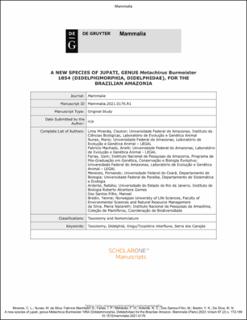A new species of jupati, genus Metachirus Burmeister 1854 (Didelphimorphia, Didelphidae) for the Brazilian Amazon
Miranda, Cleuton Lima; Nunes, Mario Da Silva; Fabrício MacHado, Arielli; Farias, Izeni Pires; Menezes, Fernando Heberson; Ardente, Natalia Carneiro; Dos Santos-Filho, Manoel; Bredin, Yennie Katarina; Da Silva, Maria Nazareth F.
Peer reviewed, Journal article
Accepted version

Åpne
Permanent lenke
https://hdl.handle.net/11250/3092053Utgivelsesdato
2023Metadata
Vis full innførselSamlinger
- Publikasjoner fra CRIStin - NINA [2364]
- Scientific publications [1392]
Sammendrag
The brown or pouchless four-eyed opossums or jupatis represent the genus Metachirus with a wide geographical range in the Neotropics. Recent studies show distinct monophyletic clades with high genetic divergence and recognized two species, Metachirus nudicaudatus and Metachirus myosuros. Nevertheless, there is a need for systematic revision with multiple sources of evidence on the taxonomy of Metachirus, which has never been fully revised. Here we describe a new species of Metachirus for the Brazilian Amazon from the Xingu/Tocantins interfluve using the unification of concepts and evolutionary significant units, morphological, genetic, and geographic data. Our analysis reveals a new species within Metachirus as a differentiated Amazonian clade from the Serra dos Carajás region and the Caxiuanã National Forest, both in the Xingu endemism centre. This new species can be distinguished from the type species, M. nudicaudatus and from M. myosuros through discrete external morphological characters, including cranium and dentition, and molecular data with an average degree of divergence, but ancient divergence time for the mitochondrial cytochrome b gene. The Amazon River delimits the distribution of the new species, which also occurs in areas under strong anthropogenic pressure, reinforcing the importance to guide conservation strategies for the region. didelphid; Serra dos Carajás; taxonomy; Xingu/ Tocantins interfluve.
